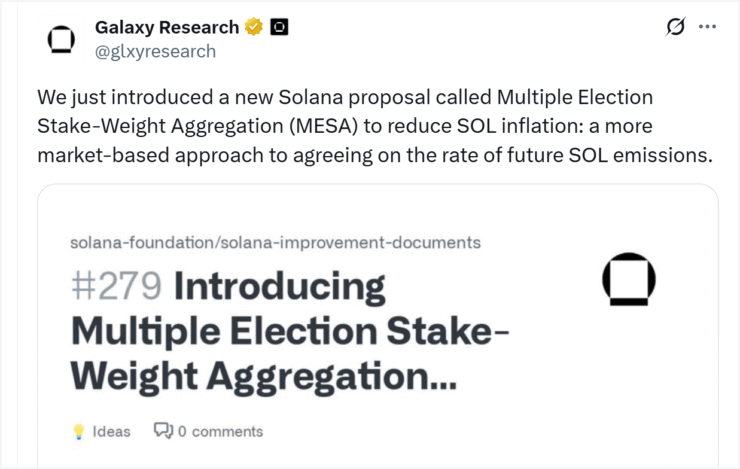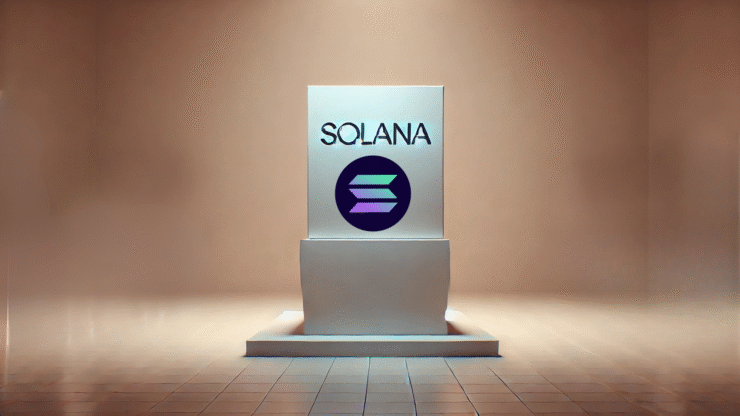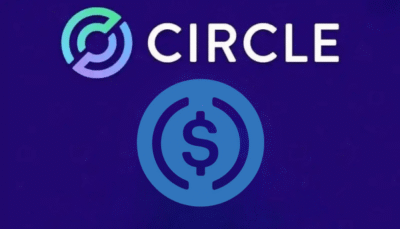Galaxy Research has unveiled a governance proposal aimed at resolving long-standing friction in Solana’s monetary policy decision-making. Titled Multiple Election Stake-Weight Aggregation (MESA), the new framework introduces a more flexible and representative voting mechanism to help reduce SOL’s inflation rate without the limitations of binary governance.
Announced on April 17, the MESA proposal allows validators to express preferences across a spectrum of inflation reduction targets, rather than choosing a simple “yes” or “no.” Final outcomes would be calculated based on a weighted average of all votes—an approach Galaxy describes as “market-driven” and more aligned with overall validator sentiment.
The proposal directly addresses the failure of SIMD-228, a prior inflation-lowering vote that failed to reach consensus despite strong community support. Galaxy’s model preserves the network’s terminal inflation target of 1.5% but introduces simultaneous voting on multiple reduction rates, streamlining governance and offering a more responsive approach to economic policy.

Overcoming Binary Limitations in Solana Governance
Solana’s current governance system forces validators to vote on narrowly scoped proposals using binary choices. This structure has proven problematic, most notably in the SIMD-228 vote, where general agreement on lowering inflation failed to materialize into an actionable outcome.
MESA seeks to fix that by allowing validators to vote across a range of deflation options. For example, if 5% of validators choose no change, 50% vote for a 30% cut, and 45% support a 33% cut, the result would average to a 30.6% deflation rate. This method better reflects diverse preferences and avoids the consensus deadlock that has stalled past efforts.
From Binary to Spectrum: A Governance Shift
Galaxy Research’s MESA proposal goes beyond technical adjustment—it reflects a philosophical shift in on-chain governance. Moving from binary to spectrum-based voting allows for nuanced policy decisions without splintering validator support.
The broader challenge it addresses is how to maintain decentralization while improving decision-making efficiency.
“Galaxy Research seeks to suggest a genuinely alternative process to achieving what we believe is the community’s broad goal, and not necessarily proscribe any particular inflation rate outcome,” the firm stated.
Solana’s inflation currently begins at 8% annually, decreasing by 15% each year until it reaches 1.5%. The present rate sits around 4.6%, with nearly 65% of all SOL—about 387 million tokens—staked, according to data from Solana Compass.
Galaxy’s affiliate, Galaxy Strategic Opportunities, plays an active role in the Solana ecosystem through staking and validation—emphasizing the firm’s interest in building scalable and consensus-driven governance tools.
With MESA, Galaxy joins a growing list of industry players exploring non-binary governance models. The proposal signals that future improvements in blockchain decision-making may depend as much on inclusive mechanics as they do on technological design.
Quick Facts
- Galaxy Research has proposed the MESA system to replace Solana’s binary voting
- MESA lets validators vote on multiple deflation targets, using weighted averages
- The model aims to make inflation votes more representative and efficient
- It reflects broader trends in evolving blockchain governance mechanisms





